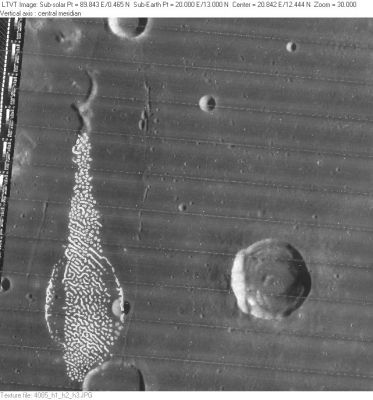Difference between revisions of "Rimae Maclear"
| (One intermediate revision by the same user not shown) | |||
| Line 7: | Line 7: | ||
|} | |} | ||
<div id="toc"> | <div id="toc"> | ||
| − | + | [http://www.lpod.org/coppermine/albums/userpics/Rimae_Maclear_LO-IV-085_LTVT.JPG [[Image:Normal_Rimae_Maclear_LO-IV-085_LTVT.JPG|external image normal_Rimae_Maclear_LO-IV-085_LTVT.JPG]]]<br /> ''[http://lpod.org/coppermine/displayimage.php?pos=-2982 LO-IV-085]'' The two main rilles of '''Rimae Maclear''' are in the left part of this detail from a [[Lunar%20Orbiter|Lunar Orbiter]] frame, unfortunately marred by a fingerprint-like flaw in the on-board film development, which they straddle. In the ''[[System%20of%20Lunar%20Craters|System of Lunar Craters]]'', the segment on the right, running from 12-km [[Al-Bakri|Al-Bakri]] (at the top margin) to 20-km [[Maclear|Maclear]] (at the bottom margin) was known as '''Rima Maclear I'''; while the much shorter parallel segment to its west, about 28 km long and terminating near 5-km '''[[Ross|Ross]] C''' (shadowed crater on the lower left margin), was '''Rima Maclear II'''. The 24-km crater to the lower right of center is [[Ross|Ross]]. The other IAU-named features in this view are 6-km '''[[Tacquet|Tacquet]] C''' (midway between [[Ross|Ross]] and [[Al-Bakri|Al-Bakri]]) and 6-km '''[[Ross|Ross]] B''' (directly above [[Maclear|Maclear]].<br /> <br /> | |
| − | |||
==Images== | ==Images== | ||
[http://www.lpod.org/coppermine/thumbnails.php?album=search&type=full&search=Rimae%20Maclear LPOD Photo Gallery] [http://www.lpi.usra.edu/resources/lunar_orbiter/bin/srch_nam.shtml?Rimae%20Maclear%7C0 Lunar Orbiter Images] [http://www.lpi.usra.edu/resources/apollo/search/feature/?feature=Rimae%20Maclear Apollo Images]<br /> <br /> | [http://www.lpod.org/coppermine/thumbnails.php?album=search&type=full&search=Rimae%20Maclear LPOD Photo Gallery] [http://www.lpi.usra.edu/resources/lunar_orbiter/bin/srch_nam.shtml?Rimae%20Maclear%7C0 Lunar Orbiter Images] [http://www.lpi.usra.edu/resources/apollo/search/feature/?feature=Rimae%20Maclear Apollo Images]<br /> <br /> | ||
| Line 31: | Line 30: | ||
<br /> <br /> | <br /> <br /> | ||
---- | ---- | ||
| − | + | </div> | |
Latest revision as of 02:12, 16 April 2018
Contents
Rimae Maclear
(current IAU name; formerly Ross Ir and Sosigenes Ir)
|
Lat: 13.0°N, Long: 20.0°E, Length: 110 km, Depth: km, Rükl 35 |
LO-IV-085 The two main rilles of Rimae Maclear are in the left part of this detail from a Lunar Orbiter frame, unfortunately marred by a fingerprint-like flaw in the on-board film development, which they straddle. In the System of Lunar Craters, the segment on the right, running from 12-km Al-Bakri (at the top margin) to 20-km Maclear (at the bottom margin) was known as Rima Maclear I; while the much shorter parallel segment to its west, about 28 km long and terminating near 5-km Ross C (shadowed crater on the lower left margin), was Rima Maclear II. The 24-km crater to the lower right of center is Ross. The other IAU-named features in this view are 6-km Tacquet C (midway between Ross and Al-Bakri) and 6-km Ross B (directly above Maclear.
Images
LPOD Photo Gallery Lunar Orbiter Images Apollo Images
Maps
(LAC zone 60A2) LAC map Geologic map LM map LTO map
Description
Description: Wikipedia
Additional Information
Nomenclature
- Named after nearby crater (Maclear).
- The current name for these rilles first appears in the System of Lunar Craters maps, in which they were given the names appearing in the caption to the title image, above.
- In the original IAU nomenclature of Named Lunar Formations, the Rima Maclear I of the System of Lunar Craters was Ross Ir (Catalog number 532 from the Collated List, where Neison had called it Ross Theta). Rima Maclear II was regarded as part of Sosigenes Ir (Catalog number 578).
- As noticed by Wilfried Tost, the pre-SLC names were used on LAC 60 (from September 1962) as well as on Geologic Map I510 (for which it serves as the base).
- The system of two arc-shaped remnants of ghost craters, between Rimae Maclear and Al-Bakri, is known to some amateur observers as "The Seagull", because of its typical shape. Thus nicknamed by David North and Akkana Peck.
LPOD Articles
Bibliography
